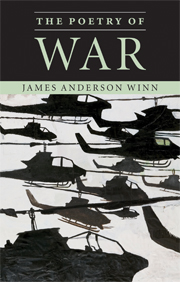 While war may rob and subvert language, simplifying the grandest of catastrophes, the political realm can rob poetry of its soul, hijacking poetic language for its own gains. James Winn, author of The Poetry of War shows us how poets strike back.
While war may rob and subvert language, simplifying the grandest of catastrophes, the political realm can rob poetry of its soul, hijacking poetic language for its own gains. James Winn, author of The Poetry of War shows us how poets strike back.
If you haven’t caught it yet, read Winn’s article in The Chronicle of Higher Education. There’s a link on his site.
Politicians have often made unscrupulous use of poetry, filching the power of verse to make wasteful and greedy policies look noble. In a brilliant act of impersonation, e. e. cummings, a pacifist who had served as an ambulance driver in World War I, produced a vivid parody of a political orator piling up the standard clichés:
“next to of course god america i
love you land of the pilgrims’ and so forth oh
say can you see by the dawn’s early my
country ’tis of centuries come and go
and are no more what of it we should worry
in every languagE. E.ven deafanddumb
thy sons acclaim your glorious name by gorry
by jingo by gee by gosh by gum
why talk of beauty what could be more beaut-
iful than these heroic happy dead
who rushed like lions to the roaring slaughter
they did not stop to think they died instead
then shall the voice of liberty be mute?”
He spoke. And drank rapidly a glass of water
Speaking as rapidly as he drinks, cummings’s blowhard orator does not bother to finish any of the scraps of patriotic verse he quotes. Fragmented and disjointed, the phrases from national hymns that he slaps together have no more meaning than the bywords that end the recitation: “by gorry / by jingo by gee by gosh by gum.” Although cummings has cunningly shaped the speaker’s regurgitated fragments into a perfectly rhymed Petrarchan sonnet, most of the rhyming words come in the middle of phrases. The formal order clashes with the urgent but pointless rhetorical order of the speech. By treating words as if they were only sounds, cummings expresses his contempt for conventional patriotism, his belief that its formulas are now empty of meaning.
But like a soldier scrawling “Kilroy was here,” he is still concerned to leave his mark on the poem. The poet always signed his name in lower-case letters (“e. e. cummings”), but in this poem, he capitalizes his initials as part of a typographical joke:
in every languagE. E.ven deafanddumb
There is a touching message in this odd-looking line. Politicians and orators may destroy the meaning of language, but poets, even as they record and mock that destruction of meaning, may still contrive to carve their initials into the otherwise meaningless surface. To do so is an assertion of freedom—not the grand, collective Liberty celebrated in empty and dishonest political speeches, but the simple, personal freedom to be, to speak, to make a mark.
Source:
e. e. cummings, “next to of course god america i” in Complete Poems, 1904–1962 (New York: Liveright, 1994), 267.
Latest Comments
Have your say!